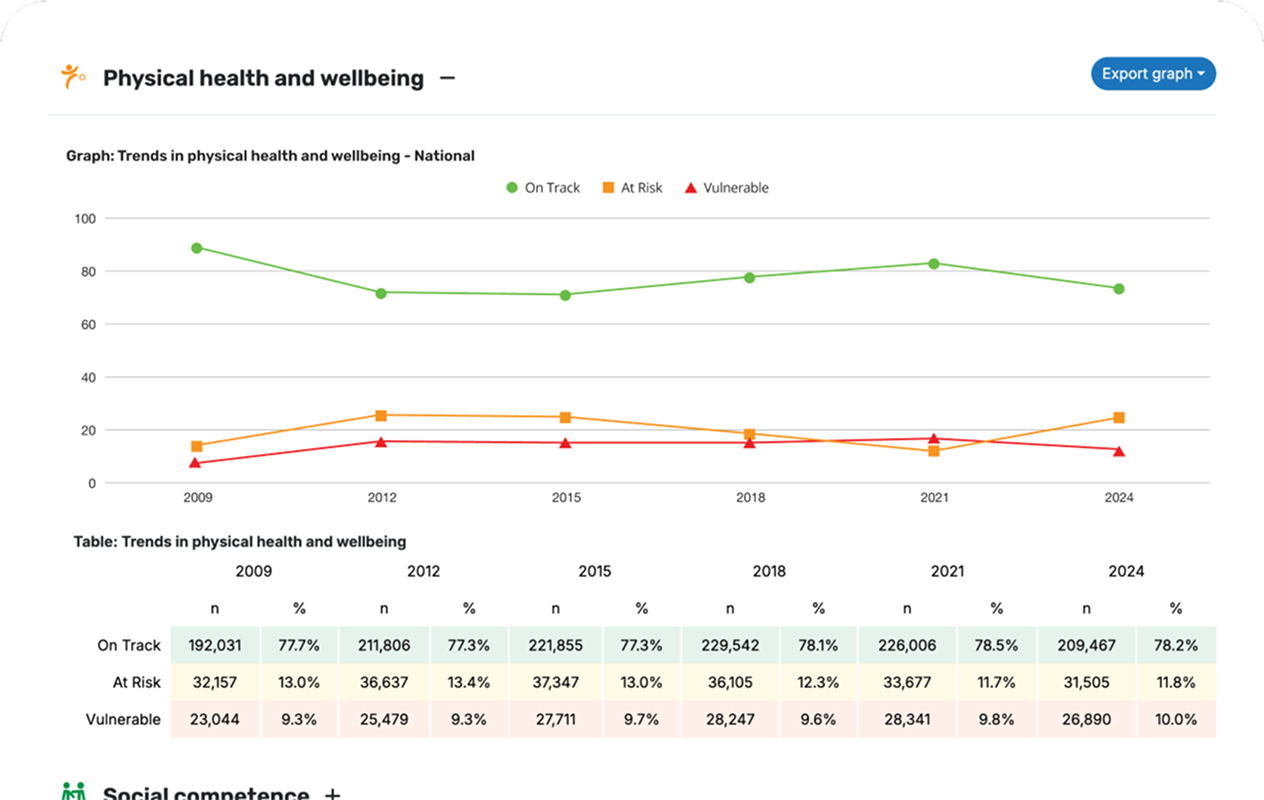Process for submitting a data application
This page outlines how to submit a successful application to the Data Management Agency (DMA).
Please read before submitting your data management query or application to:
AEDC Support
An AEDC Macrodata Application form should be completed for any customised summary data request. Applicants are required to submit a sample table in Excel format, highlighting the specific AEDC variables requested for their study and how they would like the data presented.
All organisations, except for government agencies, should submit the standard AEDC Macrodata application form. A designated ‘Government only – AEDC Macrodata Form’ is available for government agencies seeking AEDC macrodata.
The AEDC Microdata Application Form contains the data variables available to Applicants. This form should be submitted when requesting deidentified unit record data, including microdata for data linkage purposes.
All Applicants, including government agencies, must fill in the Microdata Application Form to request microdata for specific research projects.
Changes or extensions to existing applications
An amendment form must be submitted if any aspect of the project changes after an application has been submitted and/or approved. These include changes to the proposed project, details of or additional Data Users, research and publication plan, and variables requested.
This form is also used to request extensions to project end dates. Extensions of more than three months can only be granted if the project has valid Human Research Ethics Committee (HREC) approvals.
This checklist should be completed prior to submitting an amendment form to the DMA, to increase your chances of a successful and fast approval of your amendment.
AEDC Data Application Assessment Guidelines
Macrodata and microdata applications received by the DMA are assessed as promptly as possible and usually processed within ten business days. Data applicants will be advised of an expected timeframe; however, neither the DMA nor the Australian Government Department of Education can provide any guarantee on approval timeframes. These assessment guidelines outline the application criteria and process.
AEDC Data Guidelines
The AEDC Data Guidelines set out the principles and protocols governing the management, access, use, and dissemination of AEDC data in all its forms. Key responsibilities of the Data User include data storage and handling (i.e. reporting any adverse events and secure destruction of data), publishing and reporting requirements.
Research ethics requirements
The need for human ethics research approval from an approved Human Ethics Research Committee (HREC) to access AEDC data is determined by the nature of the proposed research project or use and by the nature and granularity of the AEDC data.
Generally, microdata and data linkage applications require proof of ethics approval.
While the DMA can provide some initial guidance in relation to research ethics requirements, individuals and/or organisations seeking to access AEDC Data should seek independent information from within their own organisation or the National Health and Medical Research Council (NHMRC).
For further information, refer to the AEDC Data Guidelines.
First Nations data
It is recommended that applications for data about First Nations children abide by The Australian Institute of Aboriginal and Torres Strait Islander Studies (AIATSIS) Code of Ethics for Aboriginal and Torres Strait Islander Research.
AIATSIS should also be contacted to seek ethical clearance for the disclosure of any previously unpublished data to third parties.
First Nations data is not available on the AEDC website, however the Population Health Information Development Unit (PHIDU) Social Health Atlases includes First Nations data by area.
Alternatively, you are able to submit a data request for AEDC disaggregated data to view First Nations results.
AEDC publication submission checklist
This checklist is for Data Users to complete prior to submitting their publication to the Data Management Agency for review.
The publication rules in the AEDC Data Guidelines apply to all materials containing unreleased AEDC data that are intended for circulation beyond the Authorised Data User and Permitted Data Users. This requirement extends to data integration projects undertaken by AEDC Integrating Authorities.
Community Data Explorer
Navigate the AEDC Community Data Explorer and understand the data.
